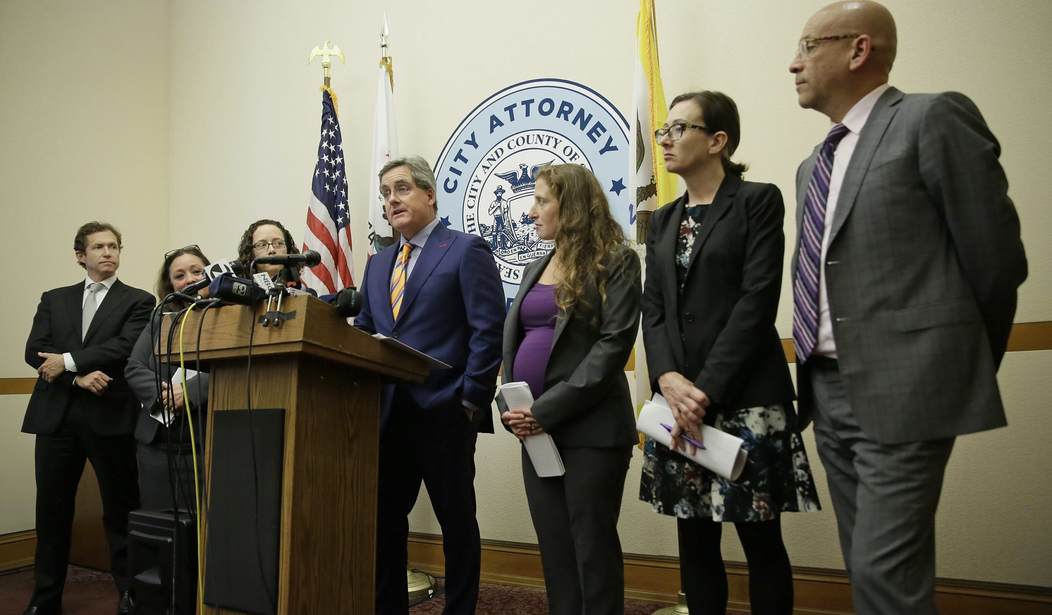A federal judge in San Francisco issued a temporary injunction today against the Trump administration’s vow to strip all federal funding from jurisdictions deemed to not be fully complying with immigration officials, ruling the federal government is limited to a few law enforcement grants that already carried the condition of cooperation.
Santa Clara County, Calif., later joined by the city and county of San Francisco, sued over President Trump’s Jan. 25 executive order “Enhancing Public Safety in the Interior of the United States,” which stated the attorney general and Homeland Security secretary, “in their discretion and to the extent consistent with law, shall ensure that jurisdictions that willfully refuse to comply with 8 U.S.C. 1373 (sanctuary jurisdictions) are not eligible to receive Federal grants.”
The California counties argued that directive “violates the separation of powers doctrine enshrined in the Constitution because it improperly seeks to wield congressional spending powers,” was “so overbroad and coercive that even if the president had spending powers, the order would clearly exceed them and violate the Tenth Amendment’s prohibition against commandeering local jurisdictions,” and was “so vague and standardless that it violates the Fifth Amendment’s Due Process Clause.”
They also said the Fifth Amendment was violated as the order sought to nix local jurisdictions’ congressionally allocated funds “without any notice or opportunity to be heard.”
The administration didn’t respond to the constitutional challenges but argued that the counties lacked standing and the order was an exercise of Trump’s “bully pulpit,” acknowledging the three federal grants covered by the order were already subject to compliance rules.
“Counsel disavowed any right through the Order for the Government to affect any other part of the billions of dollars in federal funds the Counties receive every year,” wrote Judge William Orrick in his 49-page ruling. “It is heartening that the Government’s lawyers recognize that the Order cannot do more constitutionally than enforce existing law.”
Orrick added, though, that “the rest of the Order is broader still, addressing all federal funding,” and “if there was doubt about the scope of the Order, the President and Attorney General have erased it with their public comments.”
“Although the Government’s new interpretation of the Order is not legally plausible, in effect it appears to put the parties in general agreement regarding the Order’s constitutional limitations. The Constitution vests the spending powers in Congress, not the President, so the Order cannot constitutionally place new conditions on federal funds,” the ruling continues.
“Further, the Tenth Amendment requires that conditions on federal funds be unambiguous and timely made; that they bear some relation to the funds at issue; and that the total financial incentive not be coercive. Federal funding that bears no meaningful relationship to immigration enforcement cannot be threatened merely because a jurisdiction chooses an immigration enforcement strategy of which the President disapproves.”
The judge added that the counties had met the injunction burden of showing they were “currently suffering irreparable harm” from Trump’s threat, citing uncertainty in the jurisdictions over whether vital services would be sapped through funding cuts, and had “established that they are likely to succeed on the merits of their claims.”
The temporary injunction “does not affect the ability of the Attorney General or the Secretary to enforce existing conditions of federal grants or 8 U.S.C. 1373, nor does it impact the Secretary’s ability to develop regulations or other guidance defining what a sanctuary jurisdiction is or designating a jurisdiction as such.”
It does prohibit the administration from implementing the executive order “in a way that violates the Constitution,” added Orrick, a former deputy assistant attorney general in the Civil Division at the Justice Department who assumed the bench in 2013.
Santa Clara County Board of Supervisors president Dave Cortese declared in a statement that “the politics of fear has just suffered a major setback.”
“Millions of people across the country can continue to receive essential medical care, go to school and remain active members of their communities without fear that their local governments are being forced to work against them, rather than for them,” he added.
The county counsel and pro bono counsel Keker, Van Nest & Peters LLP said they’ll now work to make the temporary injunction permanent.
“Today’s decision is a historic affirmation of the U.S. Constitution’s core principles — that the president cannot usurp powers not given to him, and that the federal government cannot use federal defunding to coerce local governments into becoming federal immigration enforcers,” said County Counsel James R. Williams.
San Francisco City Attorney Dennis Herrera declared that “faced with the law, the Trump administration was forced to back down.”
“This is why we have courts – to halt the overreach of a president and an attorney general who either don’t understand the Constitution or chose to ignore it,” Herrera added in a statement.
There was no immediate comment from Trump.
The White House issued a statement declaring “the rule of law suffered another blow, as an unelected judge unilaterally rewrote immigration policy for our nation,” adding “San Francisco, and cities like it, are putting the well-being of criminal aliens before the safety of our citizens, and those city officials who authored these policies have the blood of dead Americans on their hands.”
“Today’s ruling undermines faith in our legal system and raises serious questions about circuit shopping,” the statement said, voicing confidence that the Trump administration would “ultimately prevail in the Supreme Court, just as we will prevail in our lawful efforts to impose immigration restrictions necessary to keep terrorists out of the United States.”
“In the meantime, we will pursue all legal remedies to the sanctuary city threat that imperils our citizens, and continue our efforts to ramp up enforcement to remove the criminal and gang element from our country. Ultimately, this is a fight between sovereignty and open borders, between the rule of law and lawlessness, and between hardworking Americans and those who would undermine their safety and freedom.”
Justice Department spokesman Ian Prior said the department would continue to enforce the conditions on existing grants, adding the order “does not purport to enjoin the department’s independent legal authority to enforce the requirements of federal law applicable to communities that violate federal immigration law or federal grant conditions.”
Attorney General Jeff Sessions met today with representatives from the U.S. Conference of Mayors and stated afterward that the “vast majority of state and local jurisdictions are in compliance and want to work with federal law enforcement to keep their communities safe.”
Sessions sent a letter to 10 jurisdictions potentially in violation of 8 U.S.C. 1373 identified by the Department of Justice’s Inspector General last year, including localities that “had policies that restricted local law enforcement from sharing information about criminal aliens in their custody.”
“My letter has required those jurisdictions to submit a response by June 30 certifying they are in compliance. To date, only one has replied and we await the responses of the others,” Sessions said. “We will evaluate those responses to ensure the requirements of these grants are met. I once again urge these cities and jurisdictions to reevaluate their policies, protect their citizens and comply with the law.”
This story was updated at 11:45 p.m. EST









Join the conversation as a VIP Member